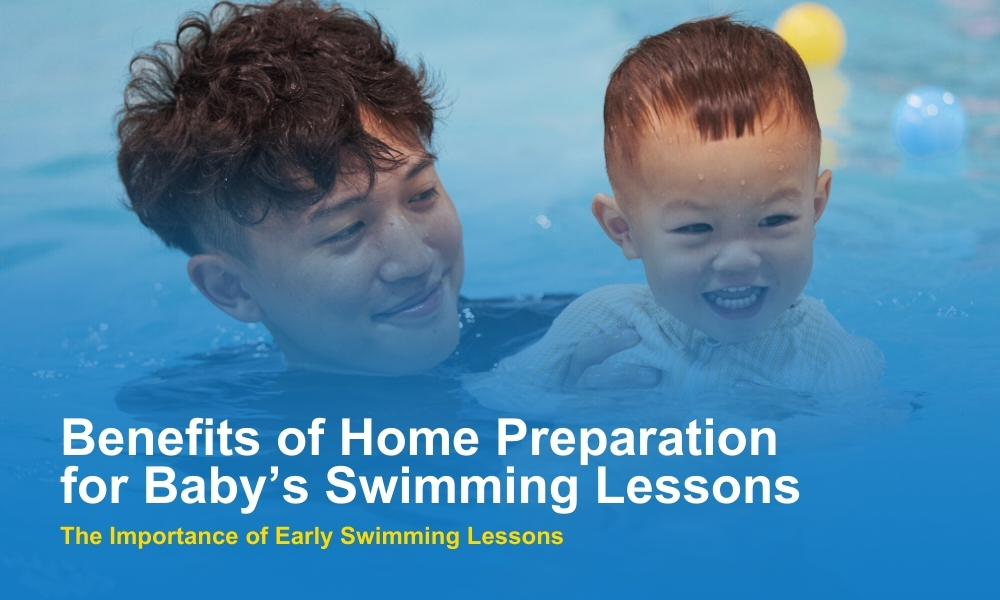The benefits of swimming for kids cannot be overstated. From a myriad of physical gains to a deeper understanding of safety in the water, having your child participate in baby swimming lessons is a great way to kick start their journey as swimmers. In this article, let’s learn about how parents can start preparing their children for a future in the water, all from the comfort of home. So much is possible before ever diving into a pool and we’d love to show you how.
The Importance Of Early Swimming Lessons
Before getting into how parents can start implementing baby swimming lessons at home, it’s useful to ask why they’re important.
What Are Some Physical Benefits?
Besides promoting physical development in a healthy, natural way, baby swimming lessons improve your child’s coordination and strength. This makes swimming one of the best activities for babies, with numerous physical benefits to speak of. Not only that, according to Swim101, swimming is considered a low-impact exercise which means it puts less stress on joints compared to other sports. This makes it a great alternative form of exercise that promotes longevity.
How Does It Improve Safety?
While parents might be concerned about the water safety of their child, parent involvement in baby swim classes can ensure nothing ever goes awry. Furthermore, children exposed to swimming from an early age showcase more comfort in the water compared to those that go without. This means that by having your child participate in baby swimming lessons, you can make sure they learn how to be as safe as possible when swimming.
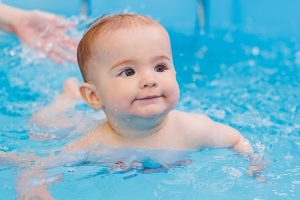
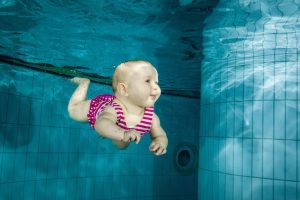
How Do You Start Baby Swimming Lessons At Home?
Now that you understand the benefits of swimming for kids, let’s take a look at how you can start baby swimming lessons at home.
Creating A Positive Association With Water
The quicker parents can create a positive association with water, the better chances children have of developing water confidence. This is why when parents ask when can babies start swimming lessons, we always recommend bathtime.
Bathtime is the perfect opportunity for getting babies used to water. Not only that, it’s great for allowing babies to enjoy being in water. This is possible with all kinds of fun games and activities like sing-alongs, bubble baths, and peek-a-boo.
Building Confidence With Water
Water can be intimidating for all ages, but this is especially true for babies. This is why it’s important to make water less intimidating through the use of floating toys, games, and activities.
Another way to develop water confidence in babies is to gently pour water over them. This helps them get used to the sensation of being covered in water and can help further down the line when they start swimming in a pool.
How Can Parents Support Their Baby’s Swimming Lessons?
Consistency Is Key
Without regular water play sessions scheduled at home, it’s impossible to ensure your child will grow up confident in their swimming abilities. This is why consistency is key and there needs to be a proactive approach regarding parent involvement in baby swim classes.
Be Patient And Encouraging
Learning how to swim is difficult and takes time. According to Swim Now, the average time it takes for babies and young kids to become proficient in the water is about a year to a year and a half! This is why parents need to be patient and encouraging during the whole process. No matter what stage of learning a child is in, it’s vital to allow them the space to learn at their own pace. This is what makes swimming fun in the long-term.
Monitor Your Child’s Reaction
Our last tip for parents supporting their baby’s swimming lesson is to always be monitoring their child’s reaction. Bathtime should be a moment of enjoyment for both the parent and child, but as a child learns new water skills, it’s normal for them to sometimes be uncomfortable or scared. It’s up to the parents to be vigilant and promptly address any signs of discomfort.
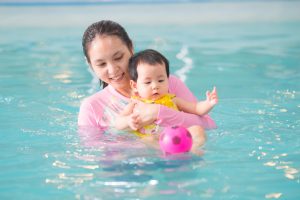
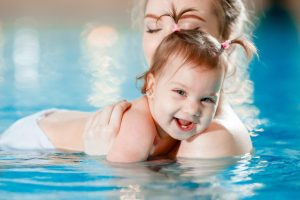
What Water Skills Can Babies Develop At Home?
Basic Water Skills
- Blowing bubbles
- Kicking with their legs
- Keeping eyes open
- Breath control
These are some of the basic water skills babies can learn at home. These translate well for the future when they begin to take swimming lessons and are great introductory skills to learn in the water. Parental support is paramount for learning these basic water skills, so it’s important to refer to the previous section when starting out with these.
Water Movements
- Floating
- Dipping
- Splashing
- Coordination
These are some of the movement skills babies can learn at home. Not only do these promote physical wellbeing, they also teach hand-eye coordination and put babies on a fast track to becoming confident in the water. Once again, parental support is paramount for learning these water movements, so it’s important to refer to the previous section when starting out with these.
Are You Looking For Baby Home Development Programs?
If you’re looking for a program to start baby swimming lessons at home, look no further than Shapland Swim Schools. Our free Baby Home Development Program is tailored to helping parents teach their newborns how to start swimming in a safe and enjoyable environment. With 8 decades of experience, we have systematized baby swimming lessons into four main objectives that will have your child looking forward to bathtime everyday.
For more information, get in touch with us today!

